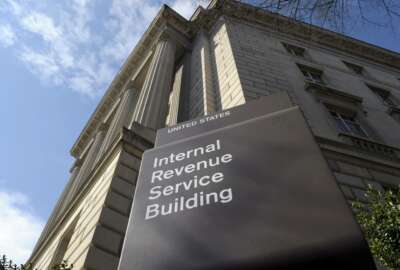
NARA becomes latest agency to expand telework in new union agreement
The National Archives and Records Administration signed a memorandum of understanding with its union to extend telework eligibility to all permanent agency...
Federal employees at the National Archives and Records Administration got a little more clarity on the future of telework at their agency.
NARA signed a memorandum of understanding (MOU) with its union, the American Federation of Government Employees, to extend telework flexibilities to all permanent agency positions.
All permanent NARA employees will be able to telework for up to the entire workweek — five days per week. But it will largely depend on the function of each individual position. The actual number of telework days that an employee receives will be based on “legitimate business needs,” AFGE said in a Dec. 19 press statement.
“This is a change from before the pandemic,” Ashby Crowder, president of AFGE Council 2578, which represents NARA employees, said in the press statement. “This means at the very least, all bargaining unit employees can have an ad hoc telework agreement in place, and when telework happens, it’s based on business needs.”
Acting National Archivist Debra Steidel Wall said the new MOU is the product of a long-standing partnership between NARA and AFGE.
“NARA and [AFGE] share a commitment to providing all staff with a safe and productive workplace, fair treatment and meaningful, engaging work,” Steidel Wall said in an email statement to Federal News Network. “This MOU furthers our common goal and implements lessons learned during the pandemic to make NARA operations more resilient and improve the on-site and at-home workplace for all employees.”
The agreement between NARA and AFGE is the latest sign-off that’s part of a growing trend for agencies to expand telework for their eligible employees. It’s following other agencies, such as the National Science Foundation, which recently added more telework opportunities for most of its staff as well.
The Office of Personnel Management also recently made a call to all agencies to start gathering data on telework numbers and overall policies. In a Dec. 8 notice to agencies, OPM said the annual “data call” for telework would become available starting in January. It’s a yearly requirement for OPM under the Telework Enhancement Act of 2010. The data collection will run through February and OPM will issue a report based on the data later in 2023.
“Telework is an important flexibility that can be used to meet a variety of agency human capital and budgetary objectives,” OPM Deputy Director Rob Shriver said in the memo. “OPM is committed to supporting the expansion of telework and assisting agencies to meet their goals.”
The agency released the results of its fiscal 2021 telework report in December. During the time that OPM collected data for this most recent annual report, federal agencies were still operating at a “maximum telework posture,” the agency said.
And at this point, there’s no going back, said OPM Director Kiran Ahuja.
“Federal agencies must continue to embrace workplace flexibilities, such as telework, to remain competitive for top talent,” Ahuja said. “Decisions about telework, however, must be driven by delivery of mission. We all work for the American public, and how we best serve them needs to be the paramount consideration.”
Congress, and some federal employees, have raised concerns about the impact of telework on agency operations and their ability to effectively serve the public. Many Republican lawmakers have said that maximum telework during the pandemic caused delays and backlogs to pile up for agencies.
On the other hand, many agencies noted in the fiscal 2021 report that the inclusion telework was an important incentive for attracting talent to the federal workforce. It may also reduce the costs of maintaining federal real estate.
“Telework and other workplace flexibilities continue to be identified as key drivers for expanding access to high quality candidates and those geographically dispersed talent who may not otherwise have access to specific industries or career opportunities,” OPM said in the report.
According to the report, during fiscal 2021, about 47% of federal employees teleworked at least some of the time. Of all feds who were eligible for telework, about 94% took advantage of it during that year, a 4% increase over fiscal 2020.
Provisions to expand, or consider expanding, telework were also included for several agencies in the omnibus federal spending bill, which President Joe Biden signed on Dec. 29.
For example, the bill gives the IRS and the Treasury Department 180 days, or about six months, to report to Congress on the impact of telework on their workforce. In particular, lawmakers are looking for more information on how telework impacted recruitment, retention and organizational performance at the agencies.
The IRS is one of several agencies, though, that has come under scrutiny from some members of Congress who have pushed for a full return-to-office for federal employees.
Regardless of the end result, more agencies will ultimately confront changes in their telework policies in the coming months and years.
“The impact of the COVID-19 pandemic, and the maximum telework posture it required, will undoubtedly become a pivotal moment that will define how agencies approach telework in the future,” OPM said.
Copyright © 2025 Federal News Network. All rights reserved. This website is not intended for users located within the European Economic Area.
Drew Friedman is a workforce, pay and benefits reporter for Federal News Network.
Follow @dfriedmanWFED





